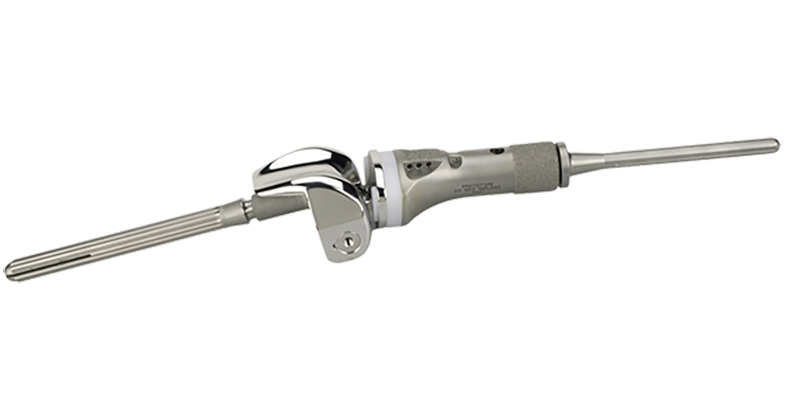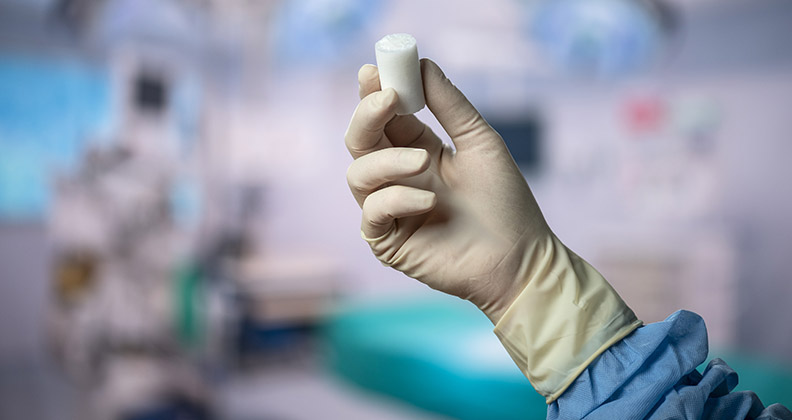
No one wants to feel that they’re just a number—in particular medical patients, and especially cancer patients. They are not data points. They are not statistics. They are individuals with a unique set of challenges that intertwine to create specific cases. Each person has his or her own anatomy, health profile, behavioral habits and personality, and each cancer manifestation has a unique geometry, composition ratio and other varied challenges that need to be addressed.
Onkos Surgical formed in 2015 with the idea that individuals requiring cancer-related surgery deserve solutions designed specifically for them, especially in a space that is underserved relative to broader cancer treatment and curative initiatives. The New Jersey-based company started with a specialized focus on sarcoma, cancer that develops in bone and connective soft tissue.
“It is through this purpose that we have been able to truly focus on improving outcomes for patients living with this rare disease, and others who are closely affiliated, and the orthopedic oncologists who treat them day in and day out,” said Patrick Treacy, Co-Founder, President and CEO of Onkos Surgical. “At our foundation is the belief that personalized treatment of these conditions can reduce the complexity of these cases and address key clinical challenges in patients who are bravely fighting a multi-faceted disease.”
Unlike most small companies, Onkos Surgical has invested heavily in technology to meet pre-, intra- and post-surgical needs.
Real-time Collaboration
Onkos Surgical’s personalized approach to treatment exists on many levels, and starts in the initial planning phase.
“We believe that every tumor and complex revision surgery should have a plan tailored to the patient’s anatomy and to the surgeon’s needs, and that requires a dedicated investment and unique approach,” Treacy said.
Onkos Surgical has a team of engineers who are singularly focused on developing personalized surgical plans and 3D models in conjunction with the surgeons who are performing the operations. Through regular communication and collaborative planning calls where complex surgical images are reviewed in detail, the engineers work in real-time with the physicians as they plan to treat patients who require the resection of tumors or the implantation of a limb salvage implant.
“Our surgical plans and 3D models [known as uDesign® and My3D™] enhance the pre-operative planning process and the intra-operative procedure by providing a deeper and more personalized level of detail for that patient’s anatomy,” Treacy said. “Our innovation pipeline is focused on driving greater personalization and precision.”
SORTing it Out
At the start of the company, Onkos Surgical made a commitment to collect prospective outcomes for the musculoskeletal oncology patient. As of March 2018, they began to do so with the sponsorship of the Surgical Oncology Research Team (SORT) Registry and its subsequent use by the orthopedic oncology industry.
The SORT Registry is the first of its kind, and acts as a platform across orthopedic oncology centers to collect outcomes data rooted in clinical, functional and psychosocial factors.
“This ties into the notion of orthopedic oncology being so complex that the prospective collection of outcomes has been a challenge to coordinate large, aggregated data sets,” Treacy said. “SORT is a cloud-based platform that allows the institution to collect data in those areas and share it across the network to enable larger data sets.”
The registry is part of the collection of technologies that Onkos Surgical invests in to further their mission of improving outcomes for orthopedic oncology patients. To-date in 2019, they have launched two products: the ELEOS Limb Salvage System indicated for distal femur, proximal femur, proximal tibia or total femur, and MyTray, which is a new dimension to their uDesign planning platform that streamlines the setup and workflow in limb salvage cases to just a few trays.
“2019 is shaping up to be our most transformative year yet,” Treacy said. “We are launching technologies in a number of areas, each of which distinctly serves to drive personalization, reduce complexity, and address key clinical challenges.”
Continuously Moving Forward
As a next step, Onkos Surgical plans to launch a number of novel 3D-printed technologies that support greater patient-specific personalization and utilize unique coatings that may address the issue of aseptic loosening, a major burden in treating diseased bone. (In 2018, Onkos Surgical agreed to a 4-year agreement with 3D Systems to collaborate on surgical planning, production of anatomical models and next-generation 3D printed implants and instruments.)
“When you put all of that together, we will offer a comprehensive and unmatched approach to tumor resection and reconstruction that not only supports limb salvage, but goes further to spare the patient’s native joint as well,” Treacy said. “These are significant clinical advancements to improve patient quality of life.”
Their ongoing vision is threefold, Treacy said. First, to make personalized precision surgical oncology the standard of care and driven by proven outcome improvements over standard approaches; second, to reduce the complexity and burden on surgeons and health systems treating cancers of the musculoskeletal system; and third, to increase advocacy and awareness leading to a cure for these rare diseases.
“That entails an expansion of our platform into areas like metastatic disease, soft tissue tumors and other clinically complex and underserved presentations for orthopedic oncologists,” he said.
Onkos Surgical’s vision is to build a $100 million oncology franchise. The company has completed more than 1,100 cases with more than 200 surgeons since its inception, and has experienced little reimbursement pushback from payors since their procedures are often one of the lower charges for oncology patients, Treacy said.
Still, as Onkos Surgical forges ahead in the fight against sarcoma and other orthopedic cancers, they realize that where there is great opportunity, there is always great challenge.
“We always say that time is not our friend,” Treacy said. “There is a lot to do and we need to move faster every day. We have ambitious goals as an organization and we are fortunate to have great investors who believe in our vision to change the world. We are building a unique company with differentiated capabilities, products and services. We know we can make a difference and this is a driving theme for our team at Onkos.”
HT
Heather Tunstall is a BONEZONE Contributor.




